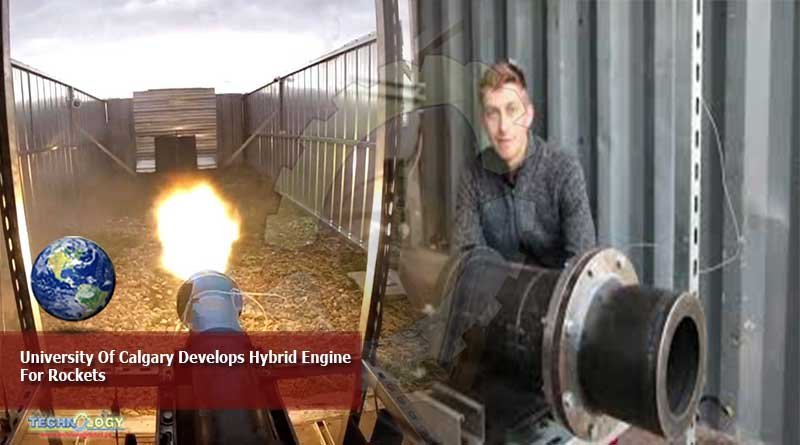A team of researchers at the University of Calgary are developing a hybrid engine for the rockets of the future.

They are develping a hybrid engine that is cheaper and safer than traditional models
Rocket launches can end up in an impressive liftoff or catastrophic explosion, but a research group at the University of Calgary is looking at developing a type of rocket engine that is safe no matter what the scenario.
A team of researchers at the University of Calgary are developing a hybrid engine for the rockets of the future.
“There’s actually a lot of aerospace research at the University of Calgary that’s maybe not so well known, but we’ve been doing rocket research for the last few years and have a lot to show for it,” said Craig Johansen, associate professor in the department of mechanical and manufacturing engineering at the U of C.
Johansen is also the SSE research chair in aerospace engineering.
He is part of a research team, in a project sponsored by Atlantis Research Labs and government funding, which aims at creating novel fuels to make safer and cheaper rockets.
Colin Hill is PhD candidate at the University of Calgary and a fellow member of the Aero-Core research lab. He says the hybrid engine testing began as a capstone project in his fourth year of engineering at the U of C and grew from there.
“Me and a few friends, we were all interested in rocketry, and so we started learning about hybrid rockets as they’re one of the safer rockets that you can build,” said Hill.
“We came across Craig, who actually had some research initiatives that aligned with what we wanted to do. And the whole thing kind of snowballed from there.”
Rocket fuel of the future
Hill, Johansen and the team have been working for the past three years to solve an old problem in terms of hybrid fuel technology and rockets.
“Hybrid rockets have actually been around for a long time, but they’ve kind of always been overlooked compared to the more common liquid and solid propellant rockets that are out there,” said Hill.
“The reason they’ve been overlooked is they didn’t scale well. So it was hard to get a lot of thrust out of a motor. So the fuel that we’re developing is actually going to solve that issue because it’s a much higher burning rate than you get with more traditional fuels.”
Hill says this technology is potentially safer and cheaper than traditional rocket fuels. Their hybrid engine uses solid, wax-based paraffin fuel and liquid nitrous oxide during combustion to create thrust.
“The hybrid rocket is a lot safer because we have the solid fuel and the liquid oxidizer separate,” he said.
“You’ve probably seen lots of videos of rocket failures where they come crashing to the ground and you have this massive fireball. But that type of failure isn’t really practical … it doesn’t occur with hybrid rockets because we have those propellant combinations separated. So the failures are much more benign and a lot safer.”
If successful, the new technology could be used not just to access space in launch vehicles, but to measure factors in atmospheric science, aerodynamics and propulsion in a more cost-effective way.
Johansen says this technology they are developing is usually tested in the lab at a smaller scale but has been flown three times with their rocket engine in a vehicle.
“It hasn’t really been done at a larger scale, we’ve had a lot of good success showing that this engine could really work at a larger scale,” he said.
Skyrocketing industry
The team’s hybrid rocket is one piece of the research taking place at the University of Calgary, says Johansen, but they are also doing exciting things like developing high speed aircraft and working on computer simulations with super computers.
“This is really just a whole suite of what we’re going to be able to design … basically from the ground up,” said Johansen.
“In Canada, this is really the biggest rocket research program that is being done at a university, and we’re really the only ones that are studying this kind of stuff on a fundamental level.”
He sees massive potential, such as creating commercial products for the aerospace industry, which would help diversify the provincial economy.
“It would be nice if this was the beginning of maybe a launch vehicle that was developed in Canada, designed by Canadians, launched from Canadian soil, which is something that we don’t have right now,” said Johansen.
“We definitely have a place in [the aerospace industry] and we have a chance to lead.”
Hill says he looks forward to their research outcomes but has an eye to the sky.
“You can always build a bigger rocket and can always go higher,” he said.
The article is originally published at cbc
